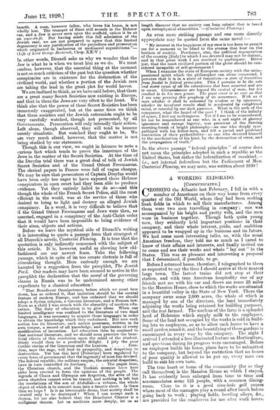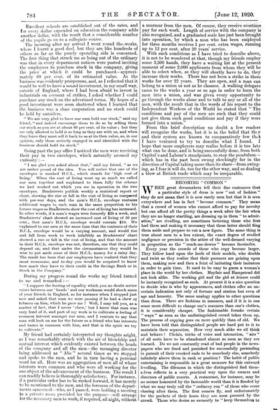A WORKING ELDORADO.
[ComsfUNICATED.]
CROSSING the. Atlantic last February, I fell in with a number of Americans on their way home from every quarter of the Old World, where they had been seeking fresh fields in which to sell their manufactures. Among them were two men travelling in company ; one was accompanied by his bright and pretty wife, and the men were in business together. Though both quite young men, they evidently held important positions in their company, and their whole interest, pride, and ambition appeared to be wrapped up in the business and its future. We had some most interesting talks, as, with the usual American freedom, they told me as much as I cared to know of their affairs and interests, and finally invited me to come and see their works and whole " lay out " in the States. This was so pleasant and interesting a proposal that I determined, if possible, to go.
Before I returned home, therefore, I telegraphed to them as requested to say the time I should arrive at their near* large town. The fastest trains did not stop at their station, and with true American hospitality one of my friends met me with his car and drove me some 28 miles to the Mansion House, close to which the works are situated in a beautiful valley in the State of New York. There the company owns some 2,000 acres, the whole of which is managed' by one of the directors, the land immediately adjoining the works being retained for building purposes, and the rest farmed. The nucleus of the farm is a splendid herd of Holsteins which supply milk to the employees. Some of the land not occupied by the works is sold in build- ing lots to employees, so as to allow each house to have a small garden round it, and the beautifying of these gardens is encouraged in every way by the company. The night I arrived 1 attended a free illustrated lecture on Horticulture, and questions during its progress were encouraged. Before an employee builds his home, plans have to be submitted to the company, but beyond the restriction that no house of poor quality is allowed to be put up, every man can build to suit his own taste.
The true heart or home of the community (for so they call themselves) is the Mansion House at which I stayed. It has evidently been enlarged from time to time and accommodates some 125 people, with a common dining- room. Close to it is a good nine-hole golf course where most of the managers play a round after lunch before going back to work ; playing fields, bowling alleys, &c., are provided for the employees for use after work hours. Excellent schools are established out of the rates, and for every dollar expended on education the company adds another dollar, with the result that a considerable number of the pupils go on to a collegiate course. The morning after my arrival I went round the .works, where I learnt a good deal, but they are like hundreds of others so far as the purely operating side is 'concerned. The first thing that struck me as being out of the ordinary was that in every department notices were posted inviting the employees to purchase stock in the company, giving the price at which it could be purchased—approxi- mately 60 per cent. of its estimated value. As the business was evidently prosperous, and, as I reflected that it would be well to have a sound investment, in my small way, outside of England, where I had been afraid to invest in industrials on account of strikes, I asked whether I could purchase any stock on the advertised terms. My hopes of a good investment were soon shattered when I learned that the business was a close corporation and no stock could be held by outsiders.
" We are very glad to have our men hold our stock," said my friend, " and indeed encourage them to do so by selling them our stock as you see at about 60 per cent. of its value ; but they are only allowed to hold it so long as they are with us, and when they leave they must sell it back to us at its then value, as, in our opinion, only those actively engaged in and identified with the business should hold its stock."
Going past the pay office I noticed the men were receiving their pay in two envelopes, which naturally aroused my curiosity :— " I am glad you asked about that," said my friend, " as we are rather proud of the idea. You will notice that one of the envelopes is marked H.C.L., which stands for ' high cost of living.' When the cost of living went up so much we called our men together and explained to them fully the scheme we had worked out which you see in operation in the two envelopes. Bradstreets publish weekly a statistical report or chart, showing the rise or fall in the cost of living as compared with pm-war days, and the men's H.C.L. envelope contains additional wages to each man in the same proportion to his former wages as Bradstreets show the cost of living has increased. In other words, if a man's wages were formerly $20 a week, and Bradstreets' chart showed an increased cost of living of 50 per cent., that man's H.C.L. envelope would contain $10. We explained to our men at the same time that the contents of their H.C.L. envelope would be a varying amount, and would rise and fall from week to week infallibly as Bradstreets' chart showed a rise or fall in the coat of living, and that the amount in their H.C.L. envelope was not, therefore, one that they could depend on, and that under the circumstances they would be wise to put aside some of their H.C.L. money for a rainy day. The result has been that our employees have realized that they must economise, and to-day you would be surprised to know how much they have to their credit in the Savings Bank or in Stock in the Company."
During my progress round the works my friend turned to me and remarked :— " I suppose the footing of equality which you no doubt notice exists between our ' heads ' and our workmen would shock some of your friends in England, as for instance when I stopped just now and asked that man we were passing if he had a chew of tobacco on him, which he gave me ? Well, I may tell you, as a matter of fact., that I never ' chew,' but I knew that man was very fond of it, and part of my work is to cultivate a feeling of common interest amongst our men, and I venture to say that man will look on me for the future as a friend who has interests and tastes in common with him, and that is the spirit we try to cultivate."
My friend had certainly interpreted my thoughts aright, as I was remarkably struck with the air of friendship and mutual interest which evidently existed between the heads of the company and all the men—the managing director being addressed as " Abe " several times as we stopped and spoke to the men, and he in turn having a personal word for all. Hero was an aggregation of men all of whose interests were common and who were all working for the one object of the advancement of the business. The result I can readily believe is thoroughly satisfactory. For instance, if a particular order has to be rushed forward, it has merely to be mentioned to the men, and the foreman of the depart- ments concerned—who, as I passed, were holding a meeting in a private room provided for the pnrpose—will arrange for the necessary men to work, if required, all night, without a murmur from the men. Of course, they receive overtime pay for such work. Length of service with the company- is' also recognized, and a graduated scale has just been brought into operation, by which a man who has been employed for three months receives 1 per cent. extra wages, running up to 12 per cent. after 20 years' service. With such conditions as I have tried to describe above, it is not to be wondered at that, though my friends employ some 3,500 hands, they have a waiting list at the present moment of some 2,000 applicants from whom they will be able to select when, as they will shortly have to do, they increase their works. There has not been a strike in these works for over 22 years. They are open, and a man can belong to a union or not as he chooses. A walking delegate came to the works a year or so ago in order to form the men into a union, and was given every opportunity to go through the works alone and to talk to any or all of the men, with the result that in the words of his report to the Independent Workers of the World he stated that " The conditions and pay of the men are such that they could not give them such good conditions and pay if they were formed into a union."
From this brief description no doubt a few readers will recognize the works, but it is in the belief that they and their system are known to comparatively few tlut I have ventured to try to describe what I found. I hope that more employers may realise before it is too late what can be done, and is being successfully done, from both Capital's and Labour's standpoints, to stop the pendulum— which has in the past been swung shockingly far in the direction of Capital taking more than its share—from swing- ing, as I fear it will do, too far the other way, and so dealing a blow at British trade which may be irreparable.







































 Previous page
Previous page